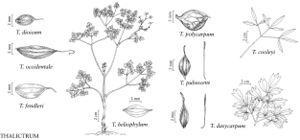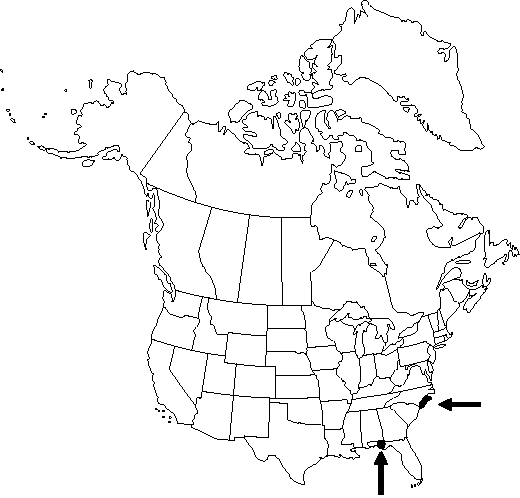Difference between revisions of "Thalictrum cooleyi"
Brittonia 11: 68. 1959.
FNA>Volume Importer |
imported>Volume Importer |
||
| (7 intermediate revisions by 2 users not shown) | |||
| Line 16: | Line 16: | ||
}}{{Treatment/ID/Special_status | }}{{Treatment/ID/Special_status | ||
|code=F | |code=F | ||
| − | |label= | + | |label=Illustrated |
}} | }} | ||
|basionyms= | |basionyms= | ||
| Line 27: | Line 27: | ||
}}<!-- | }}<!-- | ||
| − | --><span class="statement" id="st- | + | --><span class="statement" id="st-undefined" data-properties=""><b>Stems </b>erect to reclining, slender, 60-200 cm. <b>Leaves</b>: proximal cauline petiolate, distal cauline sessile to nearly sessile; petioles and rachises glabrous, neither pubescent nor glandular. <b>Leaf</b> blade: proximal cauline mostly 2×-ternately compound, distal cauline usually ternately compound; leaflets linear to narrowly lanceolate or oblanceolate, apically occasionally 2-3-lobed, 12-68 × 1-12 mm, length (2.6-)4-26 times width, membranous to leathery, margins sometimes revolute, lobe margins entire; surfaces abaxially glabrous. <b>Inflorescences</b> racemes to panicles, elongate, few flowered; peduncles and pedicels neither pubescent nor glandular. <b>Flowers</b> usually unisexual, staminate and pistillate on different plants; sepals 4-5, white to yellowish in staminate flowers, greenish in pistillate flowers, obovate, 1.5 mm; filaments white to purple, 2.5-6 mm; anthers 0.9-2.5 mm. <b>Achenes</b> 5-6, sessile or nearly sessile; stipe 0-0.4 mm; body ellipsoid, 4.5-6 mm, prominently veined, glabrous; beak 1.3-2.4 mm. <b>2n</b> = 210.</span><!-- |
-->{{Treatment/Body | -->{{Treatment/Body | ||
| Line 34: | Line 34: | ||
|distribution=Fla.;N.C. | |distribution=Fla.;N.C. | ||
|discussion=<p>Of conservation concern.</p><!-- | |discussion=<p>Of conservation concern.</p><!-- | ||
| − | --><p>Thalictrum cooleyi occurs commonly on Grifton soil and is associated with some sort of disturbance, including clearings, edges of frequently burned savannahs, roadsides, and powerline rights-of-way that are maintained by fire or mowing. Silvicultural and agricultural practices and their associated suppression of fire have seriously affected populations of T. cooleyi. Furthermore, fruit production appears to be quite low in the species (S. W. Leonard 1987).</p><!-- | + | --><p><i>Thalictrum cooleyi</i> occurs commonly on Grifton soil and is associated with some sort of disturbance, including clearings, edges of frequently burned savannahs, roadsides, and powerline rights-of-way that are maintained by fire or mowing. Silvicultural and agricultural practices and their associated suppression of fire have seriously affected populations of <i>T. cooleyi</i>. Furthermore, fruit production appears to be quite low in the species (S. W. Leonard 1987).</p><!-- |
| − | --><p>Leaves of Thalictrum cooleyi have fewer leaflets than other species of Thalictrum sect. Leucocoma.</p> | + | --><p>Leaves of <i>Thalictrum cooleyi</i> have fewer leaflets than other species of <i>Thalictrum </i>sect.<i> Leucocoma</i>.</p> |
|tables= | |tables= | ||
|references= | |references= | ||
| Line 44: | Line 44: | ||
-->{{#Taxon: | -->{{#Taxon: | ||
name=Thalictrum cooleyi | name=Thalictrum cooleyi | ||
| − | |||
|authority=H. E. Ahles | |authority=H. E. Ahles | ||
|rank=species | |rank=species | ||
| Line 57: | Line 56: | ||
|publication title=Brittonia | |publication title=Brittonia | ||
|publication year=1959 | |publication year=1959 | ||
| − | |special status=Conservation concern;Endemic; | + | |special status=Conservation concern;Endemic;Illustrated |
| − | |source xml=https:// | + | |source xml=https://bitbucket.org/aafc-mbb/fna-data-curation/src/2e0870ddd59836b60bcf96646a41e87ea5a5943a/coarse_grained_fna_xml/V3/V3_576.xml |
|genus=Thalictrum | |genus=Thalictrum | ||
|section=Thalictrum sect. Leucocoma | |section=Thalictrum sect. Leucocoma | ||
|species=Thalictrum cooleyi | |species=Thalictrum cooleyi | ||
| − | |||
| − | |||
| − | |||
| − | |||
| − | |||
| − | |||
| − | |||
| − | |||
| − | |||
| − | |||
| − | |||
| − | |||
| − | |||
| − | |||
| − | |||
| − | |||
| − | |||
| − | |||
| − | |||
| − | |||
| − | |||
| − | |||
| − | |||
| − | |||
| − | |||
| − | |||
| − | |||
| − | |||
| − | |||
| − | |||
| − | |||
| − | |||
| − | |||
| − | |||
| − | |||
| − | |||
| − | |||
| − | |||
| − | |||
| − | |||
| − | |||
| − | |||
| − | |||
| − | |||
| − | |||
}}<!-- | }}<!-- | ||
-->[[Category:Treatment]][[Category:Thalictrum sect. Leucocoma]] | -->[[Category:Treatment]][[Category:Thalictrum sect. Leucocoma]] | ||
Latest revision as of 22:49, 5 November 2020
Stems erect to reclining, slender, 60-200 cm. Leaves: proximal cauline petiolate, distal cauline sessile to nearly sessile; petioles and rachises glabrous, neither pubescent nor glandular. Leaf blade: proximal cauline mostly 2×-ternately compound, distal cauline usually ternately compound; leaflets linear to narrowly lanceolate or oblanceolate, apically occasionally 2-3-lobed, 12-68 × 1-12 mm, length (2.6-)4-26 times width, membranous to leathery, margins sometimes revolute, lobe margins entire; surfaces abaxially glabrous. Inflorescences racemes to panicles, elongate, few flowered; peduncles and pedicels neither pubescent nor glandular. Flowers usually unisexual, staminate and pistillate on different plants; sepals 4-5, white to yellowish in staminate flowers, greenish in pistillate flowers, obovate, 1.5 mm; filaments white to purple, 2.5-6 mm; anthers 0.9-2.5 mm. Achenes 5-6, sessile or nearly sessile; stipe 0-0.4 mm; body ellipsoid, 4.5-6 mm, prominently veined, glabrous; beak 1.3-2.4 mm. 2n = 210.
Phenology: Flowering summer (mid Jun-mid Jul).
Habitat: Boggy, savannahlike borders of low woodlands, and disturbed areas such as roadside ditches, clearings, and edges of frequently burned savannahs
Discussion
Of conservation concern.
Thalictrum cooleyi occurs commonly on Grifton soil and is associated with some sort of disturbance, including clearings, edges of frequently burned savannahs, roadsides, and powerline rights-of-way that are maintained by fire or mowing. Silvicultural and agricultural practices and their associated suppression of fire have seriously affected populations of T. cooleyi. Furthermore, fruit production appears to be quite low in the species (S. W. Leonard 1987).
Leaves of Thalictrum cooleyi have fewer leaflets than other species of Thalictrum sect. Leucocoma.
Selected References
None.

